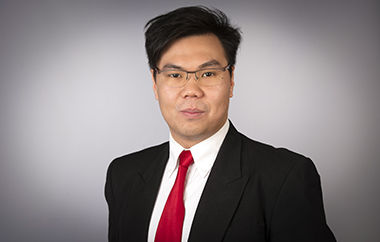PhD in Chemical Engineering
Current position: Lecturer of Chemical Engineering, Xiamen University Malaysia, Malaysia
Research focus: role of excitons and polarons on the pseudocapacitance of polymeric layered perovskite
Andrew’s research focuses on the pseudocapacitance of organic polymeric perovskites for supercapacitor applications. Organic polymers can be made from various sustainable carbon sources and, thus, are not dependent on limited elements. In addition, organic polymeric perovskites are cheaper, lighter, and of better physicochemical properties tunability than metal-based perovskites.
2018 2nd Runner-up in Young Persons’ World Lecture Competition
2018 Champion of Materials Lecture Competition
2018 STEM Fellow, National STEM Movement
2018 Gold Medal in National Nanotechnology Olympiad
2017 Silver Medal in National Nanotechnology Olympiad
2016-2019 MyBrain15 Scholar
CV as submitted for the Green Talents award (2019):
University of Malaya, Malaysia
Research focus: role of excitons and polarons on the pseudocapacitance of polymeric layered perovskite
The technology of vehicles powered by electric motors has gained increasing popularity within society due to the effort of promoting the use of cleaner energy sources. Currently, most electric cells are lithium-ion batteries which have high energy density for long mileage traveling. However, Li-ion batteries still face challenges, such as high dead weights and low power charging/discharge rates, which adversely affect the efficiency, peak power and overall performance of vehicles. Supercapacitors, on the other hand, are significantly lighter and have higher power charging/discharging rates. Thus, the idea of using supercapacitors as an alternative or in tandem with Li-ion batteries would spearhead electro mobility technology towards the production of fast charging, high Pferdestärke and power-to-weight ratio electric vehicles.
Andrew focuses his research on the pseudocapacitance of organic polymeric perovskites for supercapacitor applications. Organic polymers can be made from various sustainable carbon sources and thus are not dependent on limited elements. In addition, organic polymeric perovskites are cheaper, lighter and of better physicochemical properties tunability than metal-based perovskites. Supercapacitors made of organic polymeric perovskites can be coupled with solar-charged perovskite material to convert available solar energy into electrical energy through the formation of excitons and polarons. By using this material technology, it can help to address the well-to-wheel issue associated with current electrically powered vehicles, which still harness energy from fossil fuel combustion. As the Green Talents laureate, Andrew looks forward to the Science Forum in meeting various experts to exchange ideas and build up a global network.
The jury appreciated Andrew’s strong interdisciplinary interest and his highly relevant work in the field of material sciences. Battery technology is highly significant for the further development of electro mobility.






